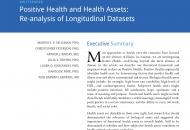What is Positive Health?
The goal of today’s health care system is generally to bring people who are sick out of illness. This takes them from negative health to a state that is neutral—free from health problems but not necessarily thriving. Positive Health’s approach works with the positive—with what is right with you–—and builds on those assets to help achieve and maintain good health.
Positive Health is the scientific study of health assets. A “health asset” is a factor that produces stronger health, over and above risk factors for disease. Positive Health works to discover which specific health assets produce longer, healthy life, and which health assets lower disease risk and health care costs. The goal is to strive for optimal health —beyond the mere absence of illness.
We’re working to identify the health assets that produce stronger health. Potential assets include subjective factors like optimism, functional factors like stable marriage, and biological factors like low blood pressure. Using direct observation and scientific study, we are examining whether and how they influence health outcomes either independently or jointly.
If health assets can be scientifically linked to positive health outcomes, the ultimate goal would be to design interventions that can help build and sustain these assets to help people increase their chances of living a healthier, longer life. Positive Health has the potential to change the way we think about health and health care.
What do we hope to find from future research?
In addition to what we already know about preventing disease and treating people who are sick, we are working to discover if there are positive assets we can influence that will help us live healthier, longer lives. We will explore whether individuals who score well on particular health variables have longer lives, lower health costs, and better prognosis when illness strikes. We will investigate creative interventions that can build and strengthen these assets to give everyone a chance at a healthier, longer life.
Potential health assets that will be assessed through scientific research include levels of Vitamin D, body-mass index, optimism, ratio of “good” to “bad” cholesterol levels, stable marriage, exceptionally low blood pressure levels, meaningful work, and rapid wound healing, among others.
Additional research will examine the following relationships:
- Life satisfaction and heart disease
- Optimism and DNA sequence length
- Good social relationships and heart disease
- DNA sequence length and heart disease
- Psychological strengths and immunity
- Psychological strengths and heart function
- Exercise and heart disease
- Physical fitness and length of life
- Physical activity and obesity




